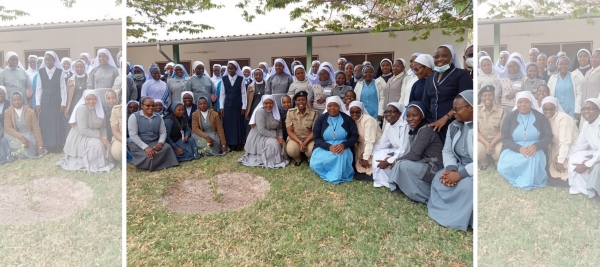A seminar on awareness of illegal human trafficking was held in Miyuji, -Dodoma August 17-19. The event was organized by the Tanzanian Conference of Religious Superiors (TCAS). Seventy-seven religious women from various congregations participated and five presenters members of AFJN (African Faith and Justice Network) contributed with their experiences and knowledge on the topic. The seminar was held in the house of the Precious Blood Missionaries: the community of John Merlini, Servant of God.
The main purpose of the seminar was to deal with this problem and find ways to bring about an end to this trade. The problem exists and is spread throughout the world. Its impact upon the victims, business and the perpetrators were talked about. The suffering and the disadvantages the victims face are staggering: separation from family, psychological problems, stress, bad environments, infectious diseases and death.
The advantages for those involved in this business are easy wealth and a comfortable and luxurious life. Some of these victims are taken by mutual agreement with family or among village leaders on false promises that are only discovered to be untrue after the victims have left. Suffering, sexual abuse, hard labor, removal of body organs (kidneys, heart, intestines, etc.) girls used as stress entertainment for men, beaten while others are killled and never found again. Most of the time it is poverty, unemployment, lack of education, desire for a better life, false beliefs and corruption that lead to it. The human being is treated like a commodity.
The presentation of these atrocities committed against the human person created in the image and likeness of God (Gen. 1:26-28) shook us deeply and called us to the responsibility each of us has to raise our voices in defense of God’s creation. (Is. 1:17)
Given the gravity and dimensions of the problem, as religious women we cannot deal with this work alone, because these organizations have used broad networks. Therefore, there is a great need to talk with the people in authority to learn the strategies they have adopted to deal with the problem.
During the seminar, we had the opportunity to visit with the offices of the Minister of the Interior, to meet Minister Simbachawene and to hear from him about the program of the Tanzanian government regarding human trafficking. After the presentation, they were happy to see the significant contribution of the Church in the fight against human trafficking.
The main purpose of the seminar was to deal with this problem and find ways to bring about an end to this trade. The problem exists and is spread throughout the world. Its impact upon the victims, business and the perpetrators were talked about. The suffering and the disadvantages the victims face are staggering: separation from family, psychological problems, stress, bad environments, infectious diseases and death.
The advantages for those involved in this business are easy wealth and a comfortable and luxurious life. Some of these victims are taken by mutual agreement with family or among village leaders on false promises that are only discovered to be untrue after the victims have left. Suffering, sexual abuse, hard labor, removal of body organs (kidneys, heart, intestines, etc.) girls used as stress entertainment for men, beaten while others are killled and never found again. Most of the time it is poverty, unemployment, lack of education, desire for a better life, false beliefs and corruption that lead to it. The human being is treated like a commodity.
The presentation of these atrocities committed against the human person created in the image and likeness of God (Gen. 1:26-28) shook us deeply and called us to the responsibility each of us has to raise our voices in defense of God’s creation. (Is. 1:17)
Given the gravity and dimensions of the problem, as religious women we cannot deal with this work alone, because these organizations have used broad networks. Therefore, there is a great need to talk with the people in authority to learn the strategies they have adopted to deal with the problem.
During the seminar, we had the opportunity to visit with the offices of the Minister of the Interior, to meet Minister Simbachawene and to hear from him about the program of the Tanzanian government regarding human trafficking. After the presentation, they were happy to see the significant contribution of the Church in the fight against human trafficking.

All the presentations affirmed that this illegal trade is being strongly fought by the government to end it in this country and abroad.
They also acknowledged that state laws have limitations, especially for those arrested. Their punishment does not correspond to the gravity of the crime. There are no laws to protect and help the victims, such as, for example, programs that provide psychological recovery and integration into the world of work.
Finally, as religious women we decided to unite with our prayer and fasting, to raise the awareness in the community about this tragedy, through the radio, newspapers, the organization of seminars and conferences in schools, strengthening the collaboration between government and the church, visiting the families on a local level to deal with the problem. We have to be courageous and united in condemning this reality, because, according to the saying: a spider’s web can tie up a lion. That means, even though the network of this business is enormous and powerful, being many we can stop it.
We thank the Tanzanian Conference of Religious Superiors (TCAS) for the preparation of the Seminar, which was an inspiration for all of us. We also thank the facilitators of the AFJN and for the CPPS community of the Servant of God, John Merlini for their hospitality toward the seminar participants. We are most grateful to our regional administration for having given us the opportunity to participate.
Participants
Sr. Everegisla Costantine, ASC
Sr. Rosalia Charles, ASC

